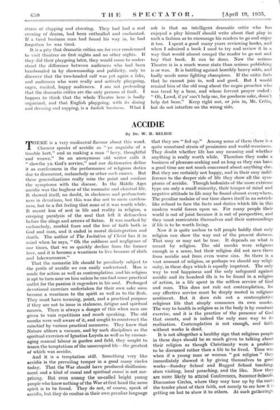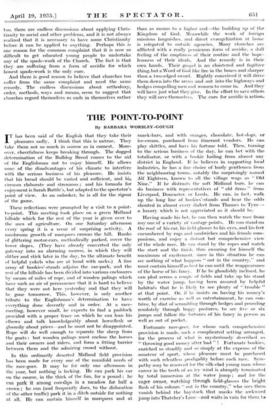ACCID1E
By Dr. W. B. SELBIE
THERE is a very mediaeval flavour about this word. Chaucer speaks of accidie as " ye anguishe of a trouble hert." and as making a man " 'levy, thoughtful -and wrawe." So an anonymous old writer calls it " slowthe yn God's service," and our dictionaries define it as carelessness in the performance of religious duties due to discontent, melancholy or other such causes. But ' these generalizations really miss the point and confuse • the symptoms with the disease. In the Middle Ages accidie was the bugbear of the monastic and eloistral life. It showed itself, no doubt, in slackness and perfunctori- ness in devotions, but this was due not to mere careless- ness, but to a flat feeling that none of it was worth while. It meant loss of zest in life and reality in religion, a creeping paralysis of the soul that left it defenceless before the slings and arrows of Satan. It was marked by melancholy, morbid fears and the loss of faith both in God and man, and it ended in moral disintegration and death. The author of The Imitation of Christ has it in mind when he says, " Oh the coldness and negligence of our times, that we so quickly decline from the former love, and it is become a weariness to live because of sloth and lukewarmness."
• That the monastic life .should be peculiarly subject to the perils of accidie we can easily understand. Man is made for action as well as contemplation. and his religion is apt to turn sour on him unless he can find some practical outlet for the passion it engenders in his soul. Prolonged devotional exercises undertaken for their own sake soon become a weariness to the spirit as well as to the flesh. They must have meaning, point, and a practical purpose if they arc not to issue in staleness, fatigue and spiritual nausea. There is always a danger of this when men are given to vain repetitions and much speaking. The old monks were well aware of it, and sought to counteract the mischief by various practical measures. They knew that Nature abhors a vacuum, and by such disciplines as the spiritual exercises of Ignatius Loyola as well as by encour- aging manual labour in garden and field, they sought to lessen the temptations of the unoccupied life—the greatest of which was accidie.
And it is a temptation, still. Something very like accidie is the prevailing temper in a- good many -circles today. That the War should have produced disillusion- ment and a kind of moral and spiritual ennui is not sur- . prising. But even among the 'so-called bright young people who knew nothing of the War at first hand the same spirit is to be found. They do not, of course, speak of accidie, but they do confess in their own- peculiar language that they are " fed up." Among some of them there is a quite unnatural strain of pessimism and world-weariness. They doubt whether life 'has any meaning and • whether anything is really worth while. Therefore they make a business of pleasure-seeking and as long as they can have a good time are not much concerned about anything else. But they are certainly not happy, and in their easy indif- ference to the deeper side of life they show all "the sym- ptoms of accidie. ThoUgh hedoniSts of the more extreme type are only a small minority, their temper of mind and negative attitude to life may be found almost everywhere. The peculiar malaise of our time shows itself in an ostrich- like refusal to face the facts and duties which life in this modern world forces upon us. For many people their world is out of joint because it is out of perspective, and they must reorientate themselves and their surroundings if life is to be worth living.
Now it is quite .useless to tell people boldly „that only religion can show the way out of the present- distress. That may or may not be true. It depends. on what is meant by religion. The old monks were.. religious enough in a sense, but their religion did not- .save them from accidie and from- even worse sins. So: there is a vast amount of religion, or perhaps we should say religi- osity, in these days which is equally impotent. The only way to real happiness and the only safeguard against accidie and its hundred ills is to be found in a religion of action, in a life spent in the selfless service of God and man. This does not rule out contemplation, for any effective service must be deeply rooted in religious sentiment. But it does rule out a contemplative religious life that simply consumes its own smoke. The way to health in religion as in the body is by constant exercise, and it is the practice of the presence of God that counts, and is indeed the only sure way to its realization. Contemplation is not enough, and faith without works is dead. • It is not altogether a healthy sign that religious people in these days should be so much given to talking about their religion as though Christianity were a problem to be discussed rather than a life to be lived. Time was when if a young man or woman " got religion " they immediately showed it by giving themselves to good works—Sunday - School and Ragged School teaching, slum visiting, local preaching, and the like. Now they are more likely to attend Conferences, -Summer Schools, Discussion Circles, where they -may tear up by the roots the tender plant of -their faith, not merely to.see how it is getting-on but to show it. to others, At such gatherings, too, there are endless discussions about applying Chris- tianity to social and other problems, and it is not always realized that it is necessary to have some Christianity before it can be applied to anything. Perhaps this is one reason for the common complaint that it is now so difficult to get educated young people to undertake any of the spade-work of the Church. The fact is that they are suffering from a form of accidie for which honest spade-work is the only cure.
And there is good reason to believe that churches too suffer from the same complaint and need the same remedy. The endless discussions about orthodoxy, order, methods, ways and means, seem to suggest that churches regard themselves as ends in themselves rather than as means to a higher end—the building up of the Kingdom of God. Meanwhile the work of foreign missions languishes, and direct evangelization at home is relegated to outside agencies. Many churches are afflicted with a really pernicious form of accidie, a dull feeling of the emptiness of their routine and the hope- lessness of their ideals. And the remedy is in their own hands. Their gospel is no cloistered and fugitive thing, but a Word of God like fire in the bones and sharper than a two-edged sword. Rightly conceived it will drive them down into the arena and out into the highways and hedges compelling men and women to come in. And they will have just what they give. In the effort to save others they will save themselves. The cure for accidie is action.







































 Previous page
Previous page